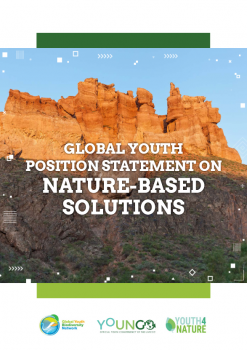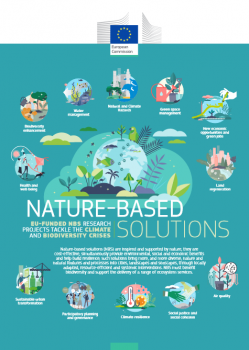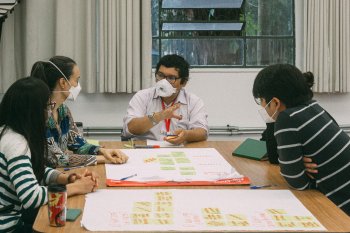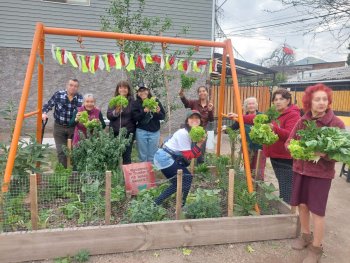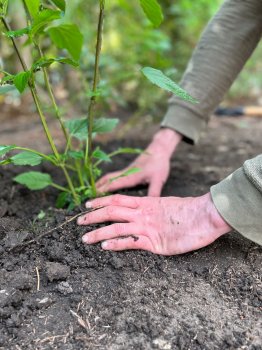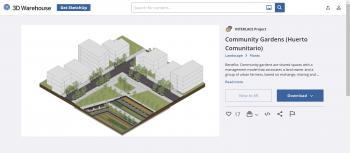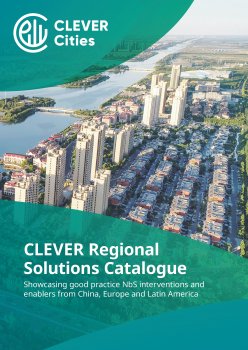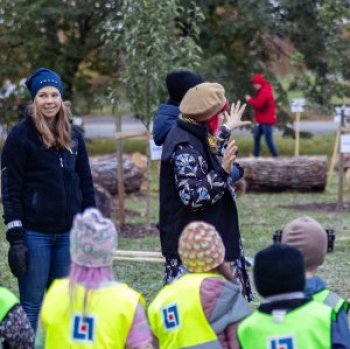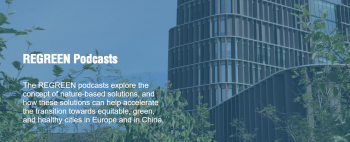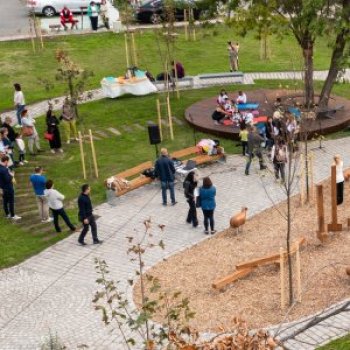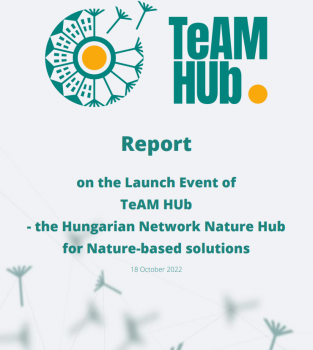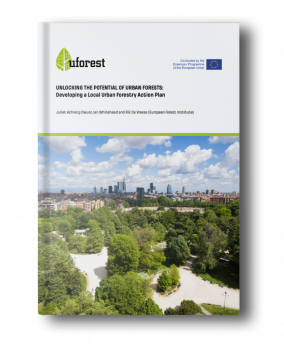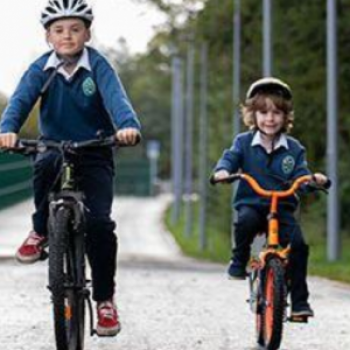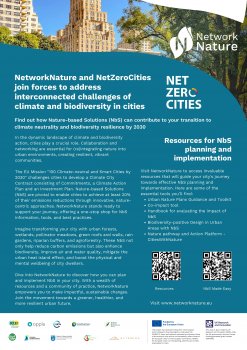- Document
Carbon accounting for PES
The economic aspect of sustainable forest management is crucial for preserving rural areas, highlighting the need to develop methods for quantifying its ecosystem services.
GLOBAL YOUTH NATURE-BASED POSITION STATEMENT ON SOLUTIONS
This statement represents the first-ever, globally representative and collectively crafted position from young people on “Nature-based Solutions”. We are addressing decision-makers and key stakeholders, to present our own views, priorities, and demands from the NbS conversation which,
- Guidance
Nature-based solutions-EU-funded NbS research projects tackle the climate and biodiversity crisis
Nature-based solutions (NbS) are inspired and supported by nature, they are cost-effective, simultaneously provide environmental, social and economic benefits and help build resilience; such solutions bring more, and more diverse, nature and natural features and processes into cities, landscapes
Conexus key learning factsheet series - The Nature Future Workshops
The Nature Futures Workshops (NFW) were an opportunity to think as creatively as possible about the desired futures for nature in our Conexus’ cities in 2050. This factsheet presents an overview of the methods used to explore these futures. Discussions in the workshops generated a series of present
Conexus Life-Lab Factsheet Series: Co-producing NbS in the “Remodelación Panamericana Norte”
The regeneration of the “Remodelación Panamericana Norte” neighborhood, facilitated by the program “Quiero Mi Barrio,” enabled the improvement of the neighborhood by bringing in Nature-based Solutions (NbS). The accompanying five-step collaborative process supported improving social security and
- Guidance
- Report
Guidelines for the calculation of Life Cycle Costs of NbS. Costs of infrastructures: elements of method for their estimation.
In this guidance report we tailor the general LCC methodology for the specificities of NBS and produce a general guideline for demo cases to calculate in a standardized way the TCO of NBS which could be then integrated in the cost-benefit analysis. Life cycle costs (LCC) are also named Total Cost
Conexus Life-Lab factsheet series - Green and biodiverse schoolyards through community participation
The Breathe/Respirar Program (BRP) is a research and action project in Buenos Aires, Argentina, on Nature-based Solutions (NbS) in schoolyards and their impact on the general well-being and learning process of children. To reach its objectives, the program builds on the collaboration between
Nature-based solutions library in Sketchup 3D Warehouse
Developing the use of NBS in urban public spaces requires urban design practices to evolve. Planners and designers are increasingly aware of and informed about the challenges of climate change, but the use of NBS still comes up against practical barriers. Although there is now a great deal of
CLEVER Regional Solutions Catalogue
The CLEVER Regional Solutions Catalogue seeks to elevate the role of nature-based solutions (NbS) across the urban landscape. It aims to inspire uptake and continued energy for implementing Nature-based Solutions that meet the varied needs and requirements of modern cities.
The development of a Gender, Inclusion and Diversity Framework for inclusive Nature-based Solutions in cities
Evidence consistently shows that the benefits Nature-based Solutions generate are determined by several individual characteristics such as gender, age, sexuality, ethnicity and disability. As a result, Nature-based Solutions can perpetuate existing inequalities and even create new inequalities
Podcasts on NbS and education
The REGREEN podcasts explore the concept of nature-based solutions, and how these solutions can help accelerate the transition towards equitable, green, and healthy cities in Europe and in China.
D6.3 Digital Placemaking tool-kit for all Cultivating Cities
In an era where technology and nature seemingly stand at opposite ends, digital placemaking offers a unique opportunity to bridge this gap, offering a harmonious blend that enhances human connection with urban nature environments through innovative digital interventions. Firstly, descriptions
Launch of the TeAM Hub - the Hungarian NetworkNature Hub for Nature-based solutions
This report provides a summary of the main outcomes of the launch event of TeAM Hub, the Hungarian NetworkNature Hub for nature-based solutions. The event gathered primarily local authorities reflecting their crucial role in promoting the widespread uptake of nature-based solutions as catalysts for
Unlocking the Potential of Urban Forests: Developing a Local Urban Forestry Action Plan
In recent years, there has been increasing interest about urban forestry as efficient nature-based approach to tackle many challenges connected to urbanisation and climate change. Faced with these challenges, cities need to build resilience through adaptation, mitigation and disaster risk reduction
Editorial Article on Human-Nature Interactions: Perspectives on Conceptual and Methodological Issues
Frontiers in Psychology editorial article. Publication Date: 19 Nov 2020 Author(s): Tadhg E. MacIntyre, Juergen Beckmann, Giovanna Calogiuri, Aoife A. Donnell, Marc V. Jones, Christopher R. Madan, Mike Rogerson, Noel E. Brick, Mark Nieuwenhuijsen and Christopher James Gidlow
- Audio
- Document
- Event
- Image
- Infographic
- Report
- Slides
- Video
Polish NbS Hub in Wroclaw
The establishment of the Hub will allow internal and external collaboration with other cities and organizations across the country to gather and transfer knowledge on nature-based solutions. The Hub's activities will focus on promoting the potential of nature-based solutions to reduce heat
NetworkNature and NetZeroCities join forces to address interconnected challenges of climate and biodiversity in cities
Find out how Nature-based Solutions (NbS) can contribute to your transition to climate neutrality and biodiversity resilience by 2030. In the dynamic landscape of climate and biodiversityaction, cities play a crucial role. Collaboration and networking are essential for (re)integrating nature into
ClairCity Educational resources
As an educator you are acutely aware that not only are young people our future, they are also one of the groups that are most at risk from air pollution and climate change. Use the resources to inspire young people into action so we can all benefit from a future with clean air!
- Document
Training for Forest Technicians, Researchers, and Employees on Fundraising and Communication Topics as Assets for Ecosystem Services Enhancement Projects.
The sale of sustainability credits and payment for ecosystem services, other than the traditional sale of timber, is an important objective and can be improved thanks to a good communication strategy and empowering specific communication skills.
- ‹ previous
- 8 of 20
- next ›

